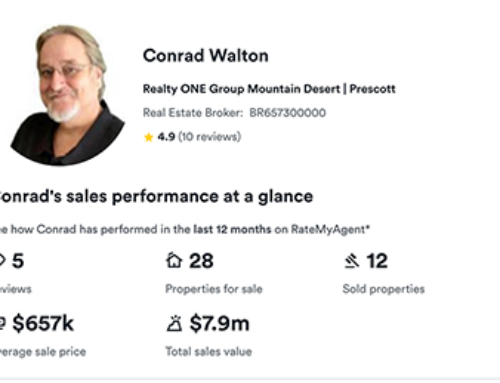I’m going to talk about staging and showing your property. And I’m going to talk about responding to offers, which is one of my favorite topics. I love to grind people.
Conrad 0:00
You need to understand what your emotions are, and keep them in check. You’ve got to try to find out what the buyer’s emotions are, and exploit them to your advantage. Doesn’t that sound horrible? Doesn’t it sounds like a horrible… I’m a horrible human being? Ah, well. I’m your real estate agent, and I’m looking out for you. Real estate is war.
Conrad 0:21
This is selling prescot, a project of Prescott, real estate.com. I’m Conrad Walton.
Conrad 0:37
This episode, I’m going to talk about staging and showing your property. And I’m going to talk about responding to offers, which is one of my favorite topics. I love to grind people.
Conrad 0:50
So before your house actually hits the market, and it’s actually shown, we should do some staging. And that can be formal or informal. Generally is not worth it to have a company come in and stage. Sometimes it is. It depends on the location, the price point. Some houses, you’ll get more money if they’re staged.
Conrad 1:13
Some people, buyers, we’re gonna talk about buyers a lot in this episode. Buyers have no imagination. You’ve got to show them and tell them every detail. In doing your staging, you need to declutter, just keep it clean. Get rid of all your personal photos.
Conrad 1:32
Because what happens is in the buying process, a person walks into this house, your house, I know it’s your house. You’ve had, you know, 20 years of history, and emotions and, and all of that, that’s all very important to you.
Conrad 1:46
Some rando off the street, no clue who you are, doesn’t even want to know who you are. They want to know about the house. We’ve got to make this house appealing to that random buyer out there. They need to be able to picture themselves in this house. You really have to think in terms of what is that random person going to think when they open that door and walk in.
Conrad 2:08
We tend to fix things up right before we sell them. Your house will never look as good as when you sell it. So now your house is on the market. Showings are going to be arranged. I’m going to get phone calls. Other agents, buyer’s agents, are going to be asking me questions about this and that, and I’ve heard the most obscure questions, but we’ll answer them all.
Conrad 2:31
We could possibly do an open house. And I personally don’t think so. I don’t think they’re really the right tool, the way the market is these days. But, maybe, and I think that depends on the location. The more dense, the more urban you are, I think the better chances of that working will be.
Conrad 2:52
Another strategy I’ve seen work really well, in this hot market that we’re in right now, where inventory is so low, you only show the house on one day, like a Saturday. And then you don’t respond to any offers until the following Tuesday. There was a house down, around the corner from me, that there had to be 10 cars out in front of it one Saturday when I drove by.
Conrad 3:15
So what happens is everybody goes and looks at it. People like it. You know, you’re gonna get a percentage of people that are going to write offers. They’re going to probably put an escalation clause in there that says, if anybody else writes an offer for an amount, they’ll go $1,000 over it, up to their limit. And you end up getting over asking with that kind of a situation.
Conrad 3:37
You can do that in a hot market. And I would suggest doing that these days. It doesn’t work quite as well on the high end. But on the lower end, man. There are people out there, Zillow, sharks, that are just circling, swimming in the darkness, lurking out there, waiting for properties to pop up on the market. And when they’re the right price point, they’re going to come in and attack, and you know, there they are going to buy that house. So you need to pit them against each other to get into a bidding war and try to get more money for it.
Conrad 4:14
So one rule I have is the seller should not be at home. When it’s shown, the buyer’s agent is going to show, not the sellers agent. So if you get me to list your house, I’m not going to be there, but the buyer’s agent will be there.
Conrad 4:29
Normally, there’s going to be a phone call, or text, some communication between the buyer agent and seller agent. If you happen to be still living in the house, then that goes in the MLS, and they can’t just drive by, and pop in, which is against our ethics rules. But people do that.
Conrad 4:47
You know, we asked for a 24 hour notice and we negotiate that. They text me. I text you. “Is Tuesday at two o’clock?” Okay, you say. Yeah, you’re gonna be, you know, you can be out of the house at that point. We schedule it and we show it.
Conrad 5:02
In Prescott, we use an application called ShowingTime. And that’s a commercial product that does scheduling, and does permission, and gets feedback. And it’s a phone app. It’s online. I’ll get a text. You know, Joe Blow, the realtor down the street wants to show your house, you know, Thursday at four o’clock, is that okay? Yes or No, I hit Yes, boom, and it schedules it and, you know, we have a showing.
Conrad 5:28
So that keeps track of who shows it. We don’t all use that. I’ll have text records too.
Conrad 5:35
Lock boxes, I think I’ve talked about. Any agent will have access to that. And I will have a record and email record of any agent who opens that lockbox. So I’ll know who has access to your house.
Conrad 5:49
Sometimes, the buyer will talk directly to the sellers agent. That is called “dual agency.” If the, if the buyer asked the sellers agent to represent both of them, both the buyer and the seller, that’s called “doing both sides of the deal.” One agent can legally, ethically, represent both the buyer and the seller.
Conrad 6:13
There becomes issues of loyalty and confidentiality that, if I’m in the middle of that, I need to be very aware of there certain things I can say and not say, very strict rules about that. Some people see as conflict of interest.
Conrad 6:30
I’ve done it a bunch, I think I’ve served both sides really well. It’s an easier process, when you do both sides. I have in the past, on multiple deals, been able to kick in part of my commission, if the buyer and the seller are close on a deal, but they’re a little bit apart on money, I’m able to make that work out. And I’ve done this a bunch. I’ve done it a bunch on both sides. But I’ve got to be really careful about what I say and who I say it to.
Conrad 7:02
One time I had a house, I was selling it for a friend. So I had a personal loyalty to my friend. The buyer asked me to represent them as well. I ended up kicking in a lot of my commission because it was for my friend and wanted to get a deal put together for them. And that’s all fine. We get down to the very end, and it didn’t appraise.
Conrad 7:23
And so my buyer came back and said, “Oh, would you take X number of dollars less?” And in my head, I am screaming “No, these buyers will buy it! They will! They’ll buy it for full price! I know they will!”
Conrad 7:37
I wanted to tell my sellers, you know, just say no, push them, grind them, you know, you get that last bit of money out of them. They’ll agree, I know they will. But I couldn’t say a thing. And my seller agreed to the lowering the price.
Conrad 7:53
And it was like, ah, I wish I could have told them, but I didn’t. If I ever get in a dual agency with you, just remember Nancy Reagan, “Just Say No”, on any kind of negotiation, lowering the price, after you’ve got an initial deal. Just don’t. Don’t agree to that.
Conrad 8:12
Now, when you get an offer, negotiate everything in the offer. It’s not just price. Price is the big one. Everybody looks at that. And, you know, that’s like the big flashing light in front of your face. But there’s also the inspection period, there’s the close of escrow date, there’s the amount of the down payment.
Conrad 8:32
If you want a really long inspection period, we could get through, you know, a three week inspection period, you can go, and they have the right at that point to just go, “I’m walking away from this deal. I don’t need this house.” So now you’ve kept me off the market for three weeks, and I don’t have a deal.
Conrad 8:50
So I would negotiate that as a seller. I’m going to negotiate. I might give you seven days. As a buyer, you want 10 days, 14 days long, as you can get.
Conrad 9:01
Negotiate that close of escrow. Generally, if you’ve got a conventional loan, six weeks for an escrow is is probably going to work. If you got a cash deal, three weeks of work because we don’t have loan underwriting and all the financial stuff. If the down payment is very small, or the earnest money is small, then your buyer has less commitment.
Conrad 9:27
If you have a higher down payment, if you’ve got a 30% down payment, and we get into arguing later about appraisals or inspections, and they want to fix the roof, or whatever, you have more room, just tell them no, I’m not going to negotiate, not going to give you anything, because you put in 200 grand down. You got the money. You go deal with it.
Conrad 9:47
If you got a buyer who’s given you 3% down, it’s FHA or VA or something low percentage rate, you know, which is good for them. But if they’re barely scraping by on the, on the down payment, and you hit any bump at all, it’s going to blow up the deal.
Conrad 10:05
So always try to get the biggest down payment you can possibly get, even though that’s going to be what it is, I mean, if they don’t have the money, they don’t have the money. If I have to equal offers in front of me, one has a 30% down payment, the others got a 5% down payment. Taking the 30%.
Conrad 10:23
I once heard from a friend of mine, another real estate agent, that they accepted a deal, and went all the way through escrow, and closed the deal with the down payment that was a 1959 Corvette, collector car. The thing was restored. They had it appraised. The seller accepted. He wanted the Corvette. So anything was possible. Everything is negotiable.
Conrad 10:47
The other thing that can happen is contingencies. Do they have to sell their home? In today’s market, you don’t want to wait around. I want to sell my house this weekend, you know, I got buyers and you know, I don’t care about your problems. They’re going to have to, their strategy as a buyer, they’re going to have to go out sell their house first, stay with friends for a while, make an offer on a house, boom, close it, and then they get to buy the new house.
Conrad 11:12
Along with any offers, you want to have a pre qualification, called “pre qual” or “proof of funds”. Somebody comes along and offers you, you know, $500,000 cash for your property. I would like to see a bank statement that says you actually have $500,000 cash.
Conrad 11:30
And the buyers, if they have more than what they’re offering, or on the pre qual, it’s the pre qual from their bank, from their lender, that says they’re qualified for x down payment, x percentage, X dollars per month, and a total amount.
Conrad 11:46
But on proof of funds, I had a guy show me a proof of funds once, buying a property, it was like $850,000, I think, show me a proof of funds. It was $7 million on it. Do we go back and grind them on price? No, that’s not going to happen. The price is the price. No matter how much they have, all you care about is that they’ve got the proof of funds.
Conrad 12:08
Now depending on your situation, and why you want to sell your house, why you would pick one offer over another, could be a lot of reasons. Most of the time, it’s just money. This guy’s you know, at $550,000. That guy’s at $575,000. I’m taking that one.
Conrad 12:24
It could be family, you like the family, that’s the buying it. You know, they got a cute kid or whatever. Maybe they write a letter and talk about how much they love your property and look forward to you know, raising their children, blah, blah, blah. Personally, I’m like, yeah, just show me the money. I don’t care about your family.
Conrad 12:44
But that’s, you know, hey, I’m a real estate agent, that’s gonna be up to you. Whatever you feel like as a seller, you know, you pick the offer, according to the values that you have.
Conrad 12:55
Now, when you start to get offers, personally, if I was a buyer’s agent, I will always lowball everybody all the time. Negotiate everything.
Conrad 13:03
Doesn’t always work though. And as a seller’s agent, I don’t like to accept less than asking for the first couple of weeks. You know, it hadn’t been on the market. Maybe I misjudged our asking price. But I’m not going to lower it until I know that, you know. It’s been out there, people have seen it. And if all I get are lowball offers, then maybe after a couple of weeks, then we’ll talk about lowering the price.
Conrad 13:29
You’ve got to have a tolerance for negotiating. People get offended. People think it’s rude. Personally, it’s just numbers on paper. And I want the biggest number I can get for you. But don’t be desperate. Unless you really are. Unless you’ve got some crushing debt that you’ve got to pay. Don’t cave on negotiating. You’re going to want to.
Conrad 13:48
You’re going to have an emotional, you know, we have the social contract of, we all need to be nice. So how about 20 grand less? Yeah, no, no. As your seller agent, I’m not nice. Let me be rude. Let me tell him No, not taking a lowball offer. Sorry, go away. I have no problem being rude to people. You know, especially in negotiations.
Conrad 14:14
You know, the convention is, well, you know, you want you want 600. I want 700. So, you go to 650. And then I go to 675. And, you know, all that that’s conventional. I don’t like doing that. It’s like, here’s, here’s my offer, take it or leave it.
Conrad 14:33
And most of the time, you go back once back and forth once or twice and you’re good. And people will, you know, accept it finally, because they’re feeling uncomfortable. They have that social awkwardness as well. So use that awkwardness against them. And be shameless and go out and, you know, ask them for everything.
Conrad 14:52
Sometimes, they got to have something. You know, we get our egos involved. Throw ’em a piece of candy. Everybody feels like a winner. Like, yeah, we’ll give you this, okay, fine, I didn’t really matter. But you feel like a big guy as the buyer. And, you know, we gave you something. And maybe that’s how you get to a number.
Conrad 15:10
This whole process is way more emotional than it is rational. You need to understand what your emotions are, and keep them in check. You’ve got to try to find out what the buyer’s emotions are, and exploit them to your advantage. Doesn’t that sound horrible? Doesn’t it sounds like a horrible… I’m a horrible human being? Ah, well. I’m your real estate agent, and I’m looking out for you. Real estate is war.
Conrad 15:36
So, somebody makes you an offer. This is a great offer. Full price offer. Gives you everything you want. Take it. We’re good, you know, move on. If there’s anything in there that you don’t like, or think you could do better, counter it, counter, negotiate everything.
Conrad 15:52
I had a little side story here. My wife and I have collected Craftsman pottery and furniture. We lived in a Craftsman house for a while. And we collected a bunch of Craftsman pottery. And I worked with a girl who actually collected antiques also. So the three of us would go to an antique swap meet. And we saw a pottery there, a Roseville pot, that I knew it was worth $100 to $125, maybe 150. If he had asked for 125, I might have paid it.
Conrad 16:30
So Cindy, the woman that I work with, she walked over and she asked about a couple other objects. How much is this? How much is that? Gets to the Roseville and says how much is that Roseville pot? And he said $25.
Conrad 16:44
My mind blew up. I am thinking “buy it, just buy it, just buy it.” And she calmly said, “Would you take 15 for it?” Like, yeah, okay, bought it for $15, worth 10 times that money.
Conrad 16:59
So no matter what they offer, no matter the deal, always counter, always negotiate. You know, if you grind too hard on them, could piss them off, and they could walk away. You don’t want to do that. You want to be a nice guy, but stand your ground. Don’t be afraid of being rude. Or let me be rude for you.
Conrad 17:18
I had an inspection period, 10 day inspection period, they ran through the inspection, we got the report in about four or five days, and it had a bunch of stuff, you know, nickle and dime. You’re always gonna find stuff on an inspection report. They came back with a huge list of stuff they wanted the sellers to fix. And it was probably $30,000 worth of stuff, you know, like a new roof. It’s like, “No, you saw the roof when you made the offer. We’re not giving you a roof” You know, so they wanted all this stuff.
Conrad 17:51
I told my sellers “No. Just tell them no. No explanation.” You know, just say No. So we did. And then we waited, because they had a full 10 days before they had to respond. And it was down to 4:30pm, on the 10th day, when it was due at five o’clock. And they came back and they accepted it with no money.
Conrad 18:15
So we didn’t have to pay anything on that. We kind of had to hold our breath. I didn’t know what they were going to do for that, you know, week in there. But you know, just say No, and people will cave. Don’t you cave, just because you feel awkward about it.
Conrad 18:29
So during this, you know, offer, negotiation, counte roffer, during this process, this is where you need to negotiate everything. Because once you accept it, you’re locked in, and you’ve got to abide by whatever is on that contract.
Conrad 18:45
I like to say there are no rules up until this point, but as soon as you sign that contract, that is the rule and you must abide by it. You know, the only way out of that is if everybody agrees to make a change. Maybe the lenders taking longer. We need to move close of escrow out. You know. We can both agree to that, and that’s not a big deal.
Conrad 19:04
But once you have an accepted, executed purchase contract, we open escrow and start the whole process. The inspection period, and all that, we’ll talk about that later. Once you have an accepted signed purchase contract, then we open escrow.
Conrad 19:22
The buyer picks the escrow company. The buyer’s agent will open the escrow, and we start moving through the process of inspection periods, and financing, and all that other stuff, disclosures.
Conrad 19:34
It can still fall out once you have that accepted contract. There are some contingencies in the contract. The first hurdle is inspection period. They can ask for money, repairs, They can reject the property, or they can accept it as is.
Conrad 19:52
The second hurdle is the appraisal. If there’s a loan and the appraisal comes in low, then we need to maybe negotiate that. Maybe not, you know. Negotiate everything. Just say No. Nancy Reagan.
Conrad 20:08
And then the last thing is the actual loan approval, loan underwriting, and funding from the lender. And that’s the last week or so of an escrow. So there’s a couple things that can fall out. Just because you have a purchase contract doesn’t mean we got a deal. You know, don’t celebrate until the check clears the bank at the end of escrow.
Conrad 20:30
Thanks for listening. Please drop a review wherever you get your podcasts. If you have any questions or need any help with real estate in Prescott, please give me a call or text me at 928-925-4428. You can email me at Conrad at PrescottRealEstate.com. You can always contact me through the website where you can also get show notes with information about this episode. That’s PrescottRealEstate.com.
Conrad 20:30
The key life is gratitude. So stay thankful







Leave A Comment